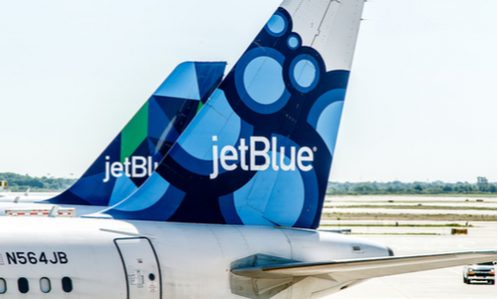
In a significant turn of events, JetBlue Airways and Spirit Airlines have announced the termination of their merger agreement on Monday. This decision comes just weeks after the two airlines faced a federal antitrust lawsuit challenging their proposed merger.
The chief executives of both JetBlue and Spirit cited regulatory obstacles as the primary reason for ending their merger agreement. The airlines had argued that joining forces was essential for them to effectively compete with larger carriers dominating the U.S. market, reported CNBC.
The culmination of the legal battle occurred in January when a federal judge sided with the Justice Department, blocking JetBlue’s attempted acquisition of the budget carrier, Spirit Airlines. Judge William Young’s ruling emphasized concerns about the potential negative impact on cost-conscious travelers who rely on Spirit’s low fares.
Although JetBlue and Spirit pursued an appeal against the court’s decision, the prospects for success were dim, as analysts had predicted. Spirit Airlines experienced a sharp decline in its shares, dropping by 14% during Monday’s morning trading, while JetBlue’s stock saw a modest increase.
Related: JetBlue & Spirit Airlines Antitrust Trial Date Set For October
Nearly two years ago, JetBlue made an unsolicited bid for Spirit Airlines, which had previously agreed to merge with fellow budget airline Frontier. Despite initial resistance, JetBlue ultimately gained shareholder approval for the takeover of Spirit.
JetBlue’s CEO, Joanna Geraghty, characterized the merger plan as a bold move intended to disrupt the industry’s status quo and provide growth opportunities. However, with the regulatory hurdles and the Justice Department’s opposition, the likelihood of obtaining approval for the merger diminished significantly.
Geraghty, who recently assumed the role of CEO, faces the challenge of addressing JetBlue’s losses and streamlining its operations. Activist investor Carl Icahn’s disclosure of a nearly 10% stake in the airline further adds pressure. Icahn secured two board seats shortly after Geraghty’s appointment, indicating a push for strategic changes within the New York-based airline.
The collapse of the merger deal presents a new set of challenges for Spirit Airlines, which is already grappling with financial difficulties exacerbated by the grounding of Airbus planes due to engine defects. Despite these setbacks, Spirit remains optimistic about its prospects for profitability, citing better-than-expected demand and initiatives aimed at enhancing the guest experience.
Spirit’s CEO, Ted Christie, highlighted the compensation received from JetBlue as well as the ongoing efforts to refinance debt and improve profitability. While the termination of the merger agreement may have dashed hopes for a transformative partnership, Spirit remains focused on navigating its financial challenges independently.
Source: CNBC
Featured News
Big Tech Braces for Potential Changes Under a Second Trump Presidency
Nov 6, 2024 by
CPI
Trump’s Potential Shift in US Antitrust Policy Raises Questions for Big Tech and Mergers
Nov 6, 2024 by
CPI
EU Set to Fine Apple in First Major Enforcement of Digital Markets Act
Nov 5, 2024 by
CPI
Six Indicted in Federal Bid-Rigging Schemes Involving Government IT Contracts
Nov 5, 2024 by
CPI
Ireland Secures First €3 Billion Apple Tax Payment, Boosting Exchequer Funds
Nov 5, 2024 by
CPI
Antitrust Mix by CPI
Antitrust Chronicle® – Remedies Revisited
Oct 30, 2024 by
CPI
Fixing the Fix: Updating Policy on Merger Remedies
Oct 30, 2024 by
CPI
Methodology Matters: The 2017 FTC Remedies Study
Oct 30, 2024 by
CPI
U.S. v. AT&T: Five Lessons for Vertical Merger Enforcement
Oct 30, 2024 by
CPI
The Search for Antitrust Remedies in Tech Leads Beyond Antitrust
Oct 30, 2024 by
CPI